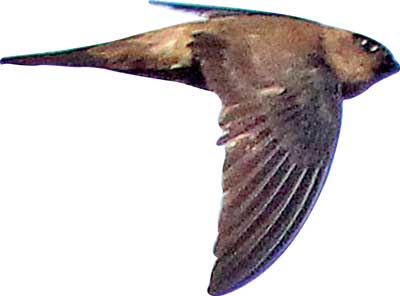Reply To:
Name - Reply Comment
Last Updated : 2024-04-23 11:51:00

Singimale is a beautiful area situated along the Nuwara Eliya- Colombo road. It captures the attention of passersby who are held in awe of its magical surroundings. Singimale is known not only for its beautiful scenery, but also for its seemingly unstoppable birds’ nest poaching that is a threat to one of Sri Lanka’s endangered species of birds.
The nests are mostly found inside railway tunnels on the Nuwara Eliya– Colombo stretch, and a train traveller would be able to catch a glimpse of these nests on both sides of the tunnel. But now, the sight of the birds’ nests scattered along the railway track is a pathetic sight. For a genuine lover of wildlife the sight of new-born baby birds fallen on the ground among the eggs and pieces of destroyed nests would certainly bring a tear to anyone’s eyes. Even from a religious point of view it would be considered a sin to crush these nests that are built with utmost care bit by bit by birds to nest, nurse and live. The sale of these birds nests brings poachers a hefty income. The poaching started in 1993, with the Customs Department detecting a consignment of 36 kgs of nests which had an illegal market value of more than Rs 10 million. The recent finding of nests of swiftlets in Singimale certainly causes concern for Sri Lanka. This small bird has a bullet shaped body , long and narrow wings as long as the body,short beak with large eyes and a short square-ended beak . Scientifically it is known as the Collocalia Unicolor . In Sri Lanka, it is called as the ‘Kedali Thurithaya’ but according to well-known environmental lawyer Jagath Gunawardene it is not the correct term, though commonly used . Often, the bird is mistaken for a seagull.

There are 77 species of swifts or members of the family Apodidae which use their saliva to bind the nesting material. The edible birds’ nests come from four species of swifts. The best known is the Edible Nest Swiftlet (Collocalia Fusciphagus) found in Thailand , Malaysia, Indonesia, Singapore and India which yield good quality nests that fetch high prices. The poorest quality nests come from the Black Nest Swiftlet (Aerodromes Maximum) which incorporates a significant amount of its own feathers to the nest giving it a black colour. Although five species of swifts are found in Sri Lanka, edible nests come only from the Indian swiftlet or the Indian Edible Nest Swift. This is the reason why the Indian swiftlet has become endangered. Gunewardene says the nesting season of these species is difficult to determine as they roost and nest in the same caves. According to E.C Wait, they breed from December to April; Ms. Cicily Lushington, gives the period to be December to June. Gunewardene has observed that the nest building occurs from late December and January up to June, and that it is the main breeding season, while a lesser number breed from August to October. They tend to build nests in mostly dark places. The breeding season can be identified when birds are seen coming in and leaving caves throughout the day, unlike at other times when they leave in the morning to return at dusk. The Indian swiftlet is a fast and powerful flier that covers long distances within a short time. Their food consists chiefly of small fling insects that are caught and swallowed in flight. The life story of these birds is interesting, but poaching remains a serious problem What is the reason for this? Is it an illegal business being done using third parties? Are the authorities aware of this problem?
According to Gunewardene villagers in these areas get well paid for [collecting] nests. So, clearly they are being handled by third parties. This is an illegal act which the police and the Wildlife Department have authority to stop.
The Indian Edible Nest Swift has been a protected species under the Fauna and Flora Protection Ordinance since 1964, making Sri Lanka the first country to afford protection to a species of Edible Nest Swifts. According to section 40 , it is an offence to kill , wound , take , any bird or destroy or keep in possession any bird , nest or egg or their parts. According to section 40 , it is also an offence to export or attempt to export any bird, part, eggs or nests of any species of animals without a permit issued by the Department of Wildlife Conservation. It is important to note that the punishments under the Fauna and Flora Protection Ordinance were enhanced by the Amendment Act No:49 0f 1993 , passed by Parliament in early August 1993 just a few weeks before the first instances of the edible nest collection came to be noticed. The ordinance was amended again through Act No 22 of 2009 which increased penalties even more. Any offence under section 30 now carries a penalty between Rs.20,000 to Rs. 50,000 and a possible jail term of 2 to 5 years.
The Convention on the International Trade in Endangered Species of Plants and Animals (CITES) often hailed as a vital conservation convention and a saviour of wildlife, has failed to afford any protection to these species even fifteen years after the problem was brought to their attention. Gunewardene says, it is mostly countries like the U.S and European countries that make the best use of that shortcoming. Consequently, such countries are not too concerned about conservation. Another reason for this illegal trade is that people that consume these nests believe that the saliva in the nests helps to cure illnesses. Speaking of its health benefits , Gunewardene says the claims are completely false. The saliva contains proteins, and carbohydrates which are of little importance to the human body. The proteins found in the saliva are muco-proteins which have very little nutritional value. The nest is made out of hardened saliva, with some mosses, lichens, fibres and feathers that the birds pick while in flight. The saliva is secreted by two salivary glands below the tongue and flow as viscous transparent threads that harden into a translucent yellowish white substance. It takes a maximum of three months, to build a nest.
The consumption of birds’ nests started in China and is used as a soup mostly in Hong Kong, where it costs 50 dollars per serving. It is believed to be an antidote to rejuvenate and cure tuberculosis. But now, the main importers of these nests are the US and Europe. Because of the profits they gain, they have no intention of halting this racket either. Western countries use these nests not only for soups but also as instant drinks , essences, mixed with candy as sweets, and made into stuffing and stews. It is intriguing how the so-called rich and developed countries get misled by these myths and support smugglers to continue the racket.
Deputy Director of the Customs Bio-diversity Protection Unit , F.R.D.A.M.G Niyarepola said they have detected and alerted their officers of the situation and that they were informed of people trying to break nests of these endangered species.
“If we can get these smugglers at the border we can confiscate the nests. But, the subject is under the Wildlife Department; the step we can take is only to alert our officers. We cannot do anything else but the Wildlife Department and the police have the authority to do something about it. The Indian Edible Nest swift is on the verge of disappearing from Sri Lanka forever. Already there are many species that are fast disappearing. It’s time the relevant authorities took necessary action to protect these precious gifts,” he said.

Add comment
Comments will be edited (grammar, spelling and slang) and authorized at the discretion of Daily Mirror online. The website also has the right not to publish selected comments.
Reply To:
Name - Reply Comment
On March 26, a couple arriving from Thailand was arrested with 88 live animal
According to villagers from Naula-Moragolla out of 105 families 80 can afford
Is the situation in Sri Lanka so grim that locals harbour hope that they coul
A recent post on social media revealed that three purple-faced langurs near t

21 Apr 2024